广东专用高中英语学业水平合格性考试专题复习专题一 冠词(30张ppt)
文档属性
| 名称 | 广东专用高中英语学业水平合格性考试专题复习专题一 冠词(30张ppt) | 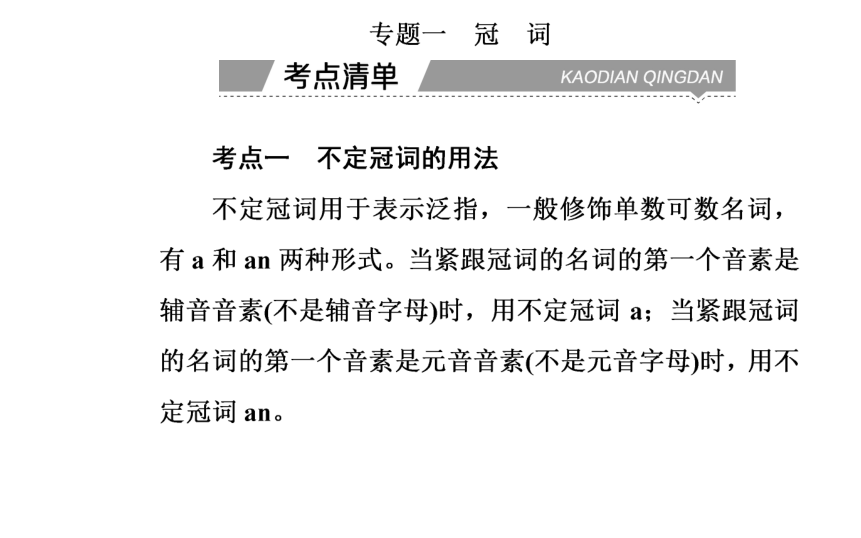 | |
| 格式 | ppt | ||
| 文件大小 | 2.1MB | ||
| 资源类型 | 教案 | ||
| 版本资源 | 通用版 | ||
| 科目 | 英语 | ||
| 更新时间 | 2022-04-28 19:58:10 | ||
图片预览

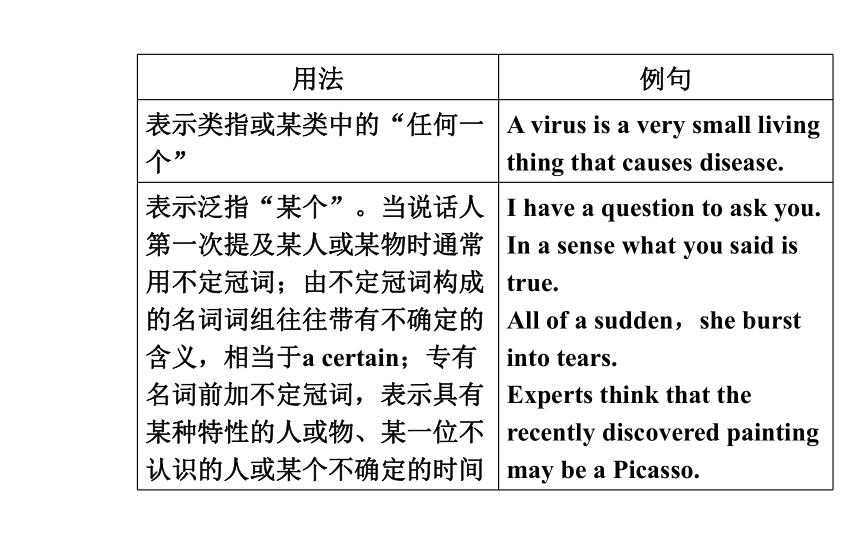
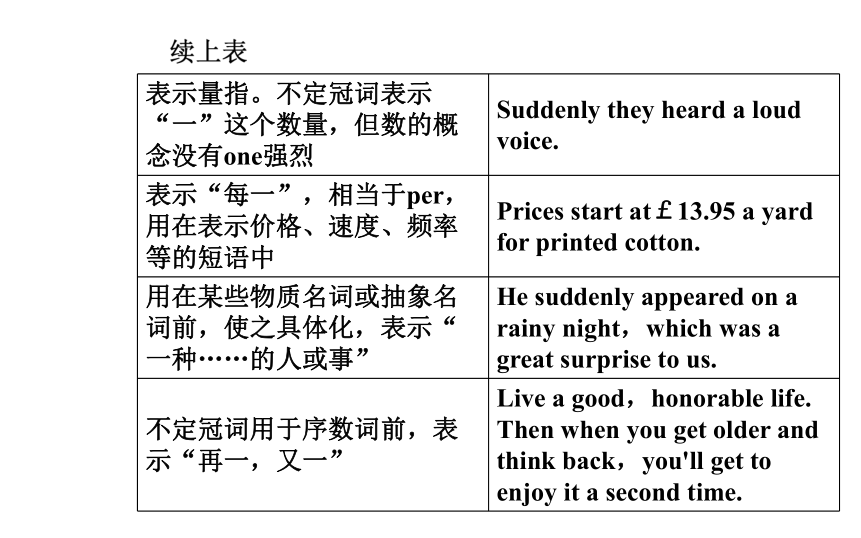
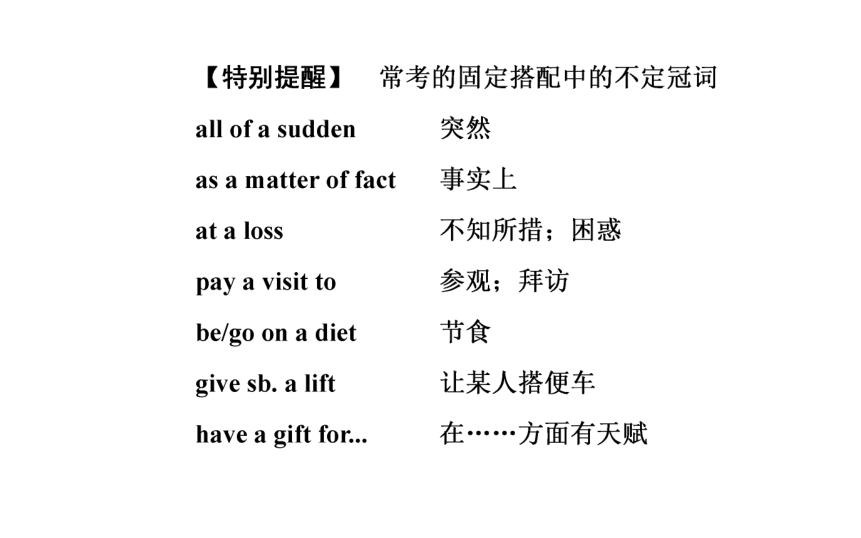
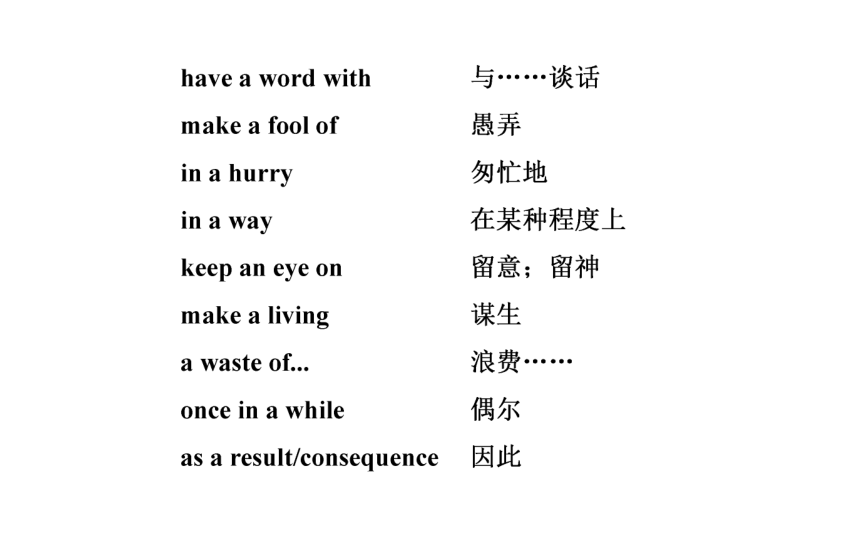
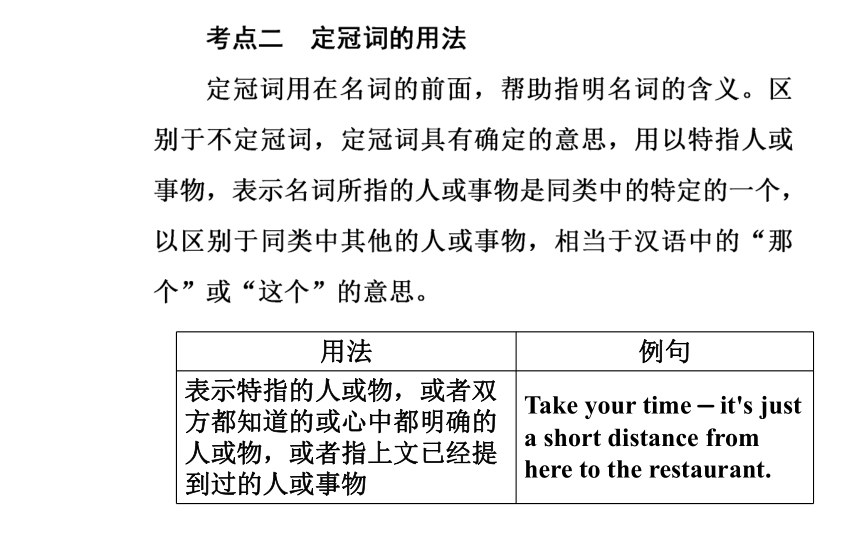
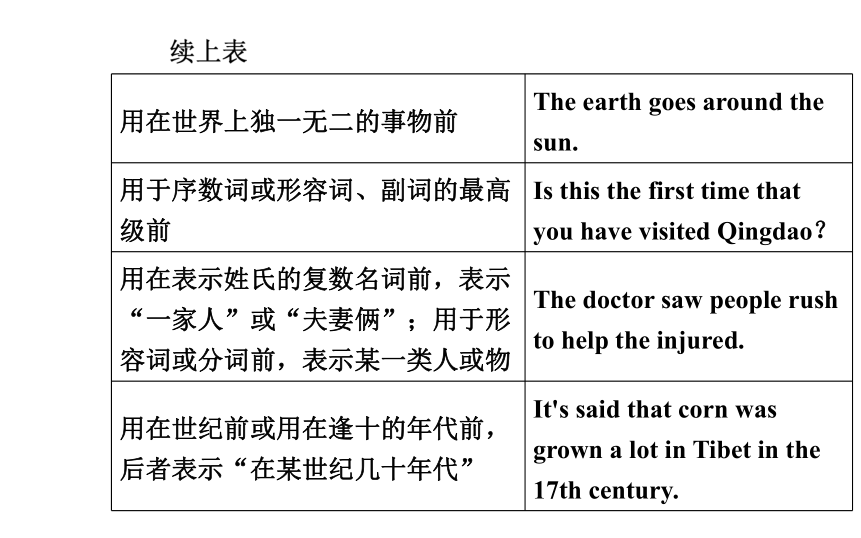
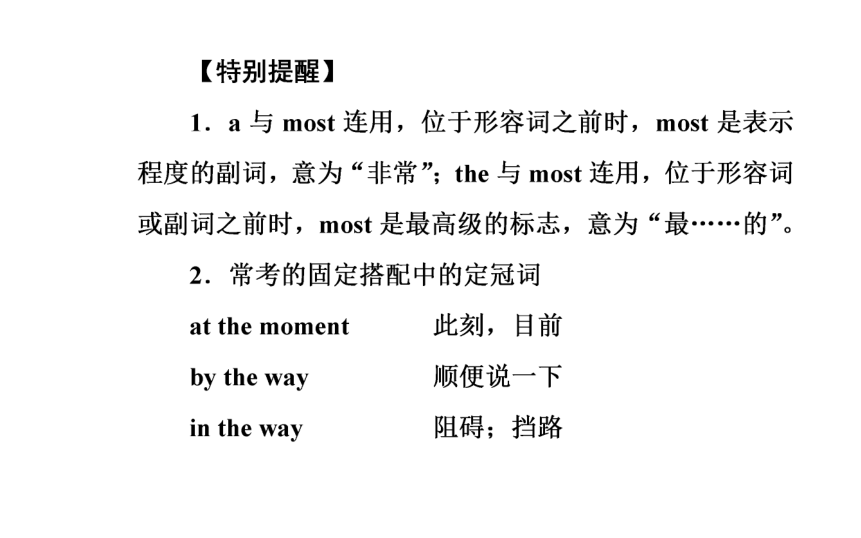
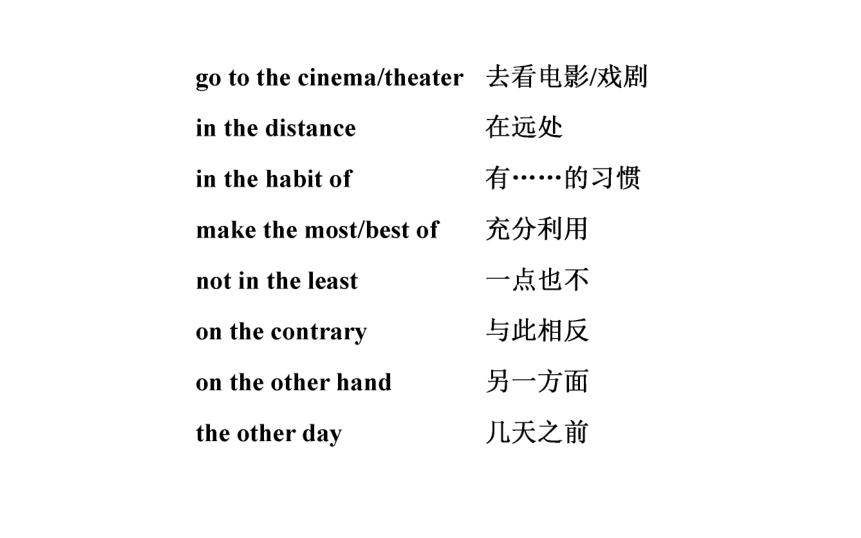
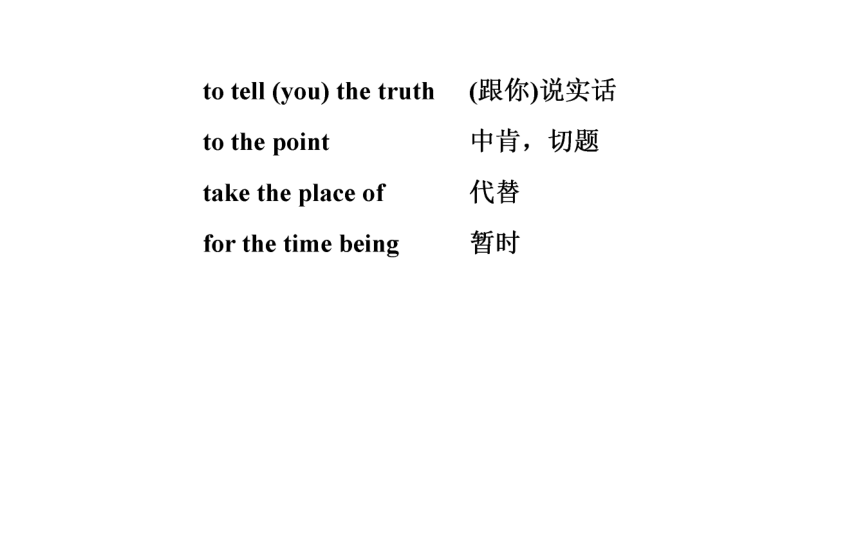
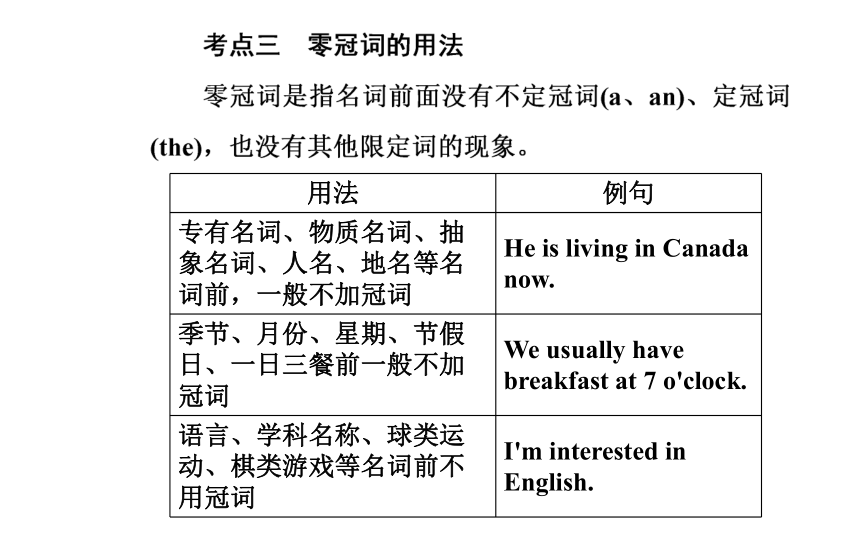
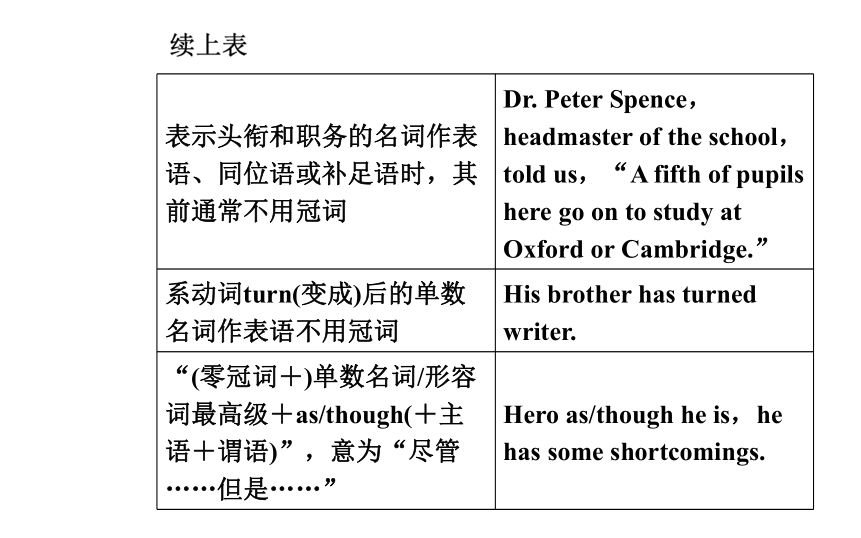
文档简介
(共30张PPT)
用法 例句
表示类指或某类中的“任何一个” A virus is a very small living thing that causes disease.
表示泛指“某个”。当说话人第一次提及某人或某物时通常用不定冠词;由不定冠词构成的名词词组往往带有不确定的含义,相当于a certain;专有名词前加不定冠词,表示具有某种特性的人或物、某一位不认识的人或某个不确定的时间 I have a question to ask you.
In a sense what you said is true.
All of a sudden,she burst into tears.
Experts think that the recently discovered painting may be a Picasso.
表示量指。不定冠词表示
“一”这个数量,但数的概念没有one强烈 Suddenly they heard a loud voice.
表示“每一”,相当于per,用在表示价格、速度、频率等的短语中 Prices start at£13.95 a yard for printed cotton.
用在某些物质名词或抽象名词前,使之具体化,表示“一种……的人或事” He suddenly appeared on a rainy night,which was a great surprise to us.
不定冠词用于序数词前,表示“再一,又一” Live a good,honorable life. Then when you get older and think back,you'll get to enjoy it a second time.
用法 例句
表示特指的人或物,或者双方都知道的或心中都明确的人或物,或者指上文已经提到过的人或事物 Take your time — it's just a short distance from here to the restaurant.
用在世界上独一无二的事物前 The earth goes around the sun.
用于序数词或形容词、副词的最高级前 Is this the first time that you have visited Qingdao?
用在表示姓氏的复数名词前,表示“一家人”或“夫妻俩”;用于形容词或分词前,表示某一类人或物 The doctor saw people rush to help the injured.
用在世纪前或用在逢十的年代前,后者表示“在某世纪几十年代” It's said that corn was grown a lot in Tibet in the 17th century.
用法 例句
专有名词、物质名词、抽象名词、人名、地名等名词前,一般不加冠词 He is living in Canada now.
季节、月份、星期、节假日、一日三餐前一般不加冠词 We usually have breakfast at 7 o'clock.
语言、学科名称、球类运动、棋类游戏等名词前不用冠词 I'm interested in English.
表示头衔和职务的名词作表语、同位语或补足语时,其前通常不用冠词 Dr. Peter Spence,headmaster of the school,told us,“A fifth of pupils here go on to study at Oxford or Cambridge.”
系动词turn(变成)后的单数名词作表语不用冠词 His brother has turned writer.
“(零冠词+)单数名词/形容词最高级+as/though(+主语+谓语)”,意为“尽管……但是……” Hero as/though he is,he has some shortcomings.
用法 例句
表示类指或某类中的“任何一个” A virus is a very small living thing that causes disease.
表示泛指“某个”。当说话人第一次提及某人或某物时通常用不定冠词;由不定冠词构成的名词词组往往带有不确定的含义,相当于a certain;专有名词前加不定冠词,表示具有某种特性的人或物、某一位不认识的人或某个不确定的时间 I have a question to ask you.
In a sense what you said is true.
All of a sudden,she burst into tears.
Experts think that the recently discovered painting may be a Picasso.
表示量指。不定冠词表示
“一”这个数量,但数的概念没有one强烈 Suddenly they heard a loud voice.
表示“每一”,相当于per,用在表示价格、速度、频率等的短语中 Prices start at£13.95 a yard for printed cotton.
用在某些物质名词或抽象名词前,使之具体化,表示“一种……的人或事” He suddenly appeared on a rainy night,which was a great surprise to us.
不定冠词用于序数词前,表示“再一,又一” Live a good,honorable life. Then when you get older and think back,you'll get to enjoy it a second time.
用法 例句
表示特指的人或物,或者双方都知道的或心中都明确的人或物,或者指上文已经提到过的人或事物 Take your time — it's just a short distance from here to the restaurant.
用在世界上独一无二的事物前 The earth goes around the sun.
用于序数词或形容词、副词的最高级前 Is this the first time that you have visited Qingdao?
用在表示姓氏的复数名词前,表示“一家人”或“夫妻俩”;用于形容词或分词前,表示某一类人或物 The doctor saw people rush to help the injured.
用在世纪前或用在逢十的年代前,后者表示“在某世纪几十年代” It's said that corn was grown a lot in Tibet in the 17th century.
用法 例句
专有名词、物质名词、抽象名词、人名、地名等名词前,一般不加冠词 He is living in Canada now.
季节、月份、星期、节假日、一日三餐前一般不加冠词 We usually have breakfast at 7 o'clock.
语言、学科名称、球类运动、棋类游戏等名词前不用冠词 I'm interested in English.
表示头衔和职务的名词作表语、同位语或补足语时,其前通常不用冠词 Dr. Peter Spence,headmaster of the school,told us,“A fifth of pupils here go on to study at Oxford or Cambridge.”
系动词turn(变成)后的单数名词作表语不用冠词 His brother has turned writer.
“(零冠词+)单数名词/形容词最高级+as/though(+主语+谓语)”,意为“尽管……但是……” Hero as/though he is,he has some shortcomings.
